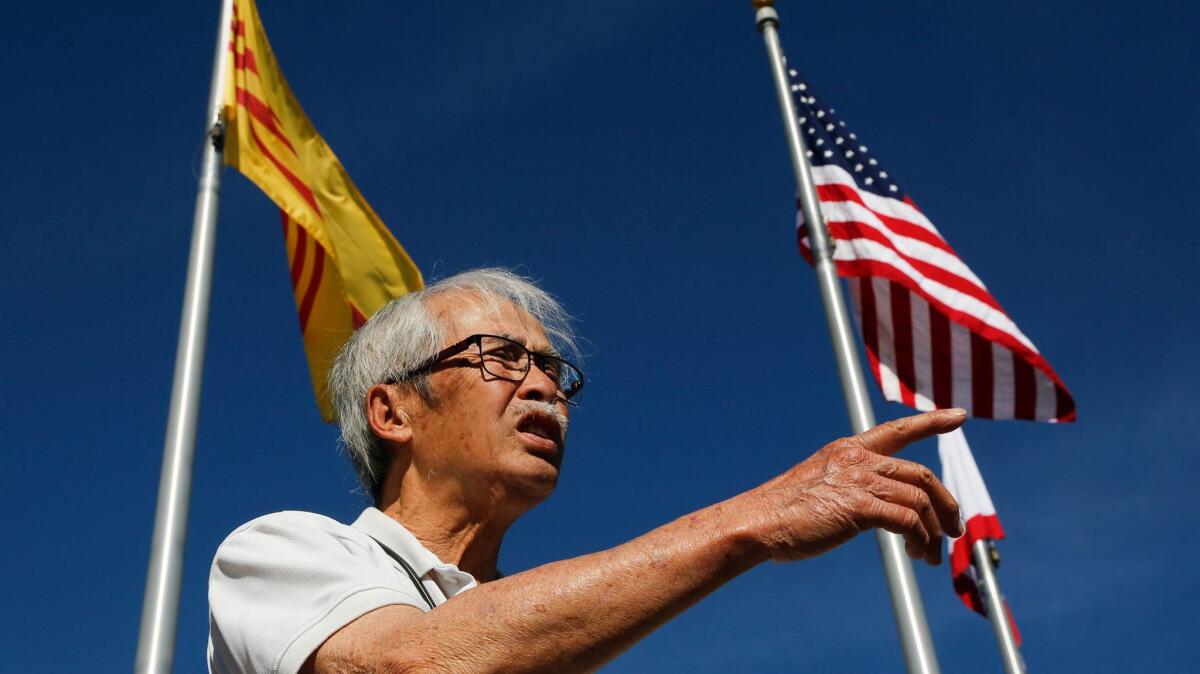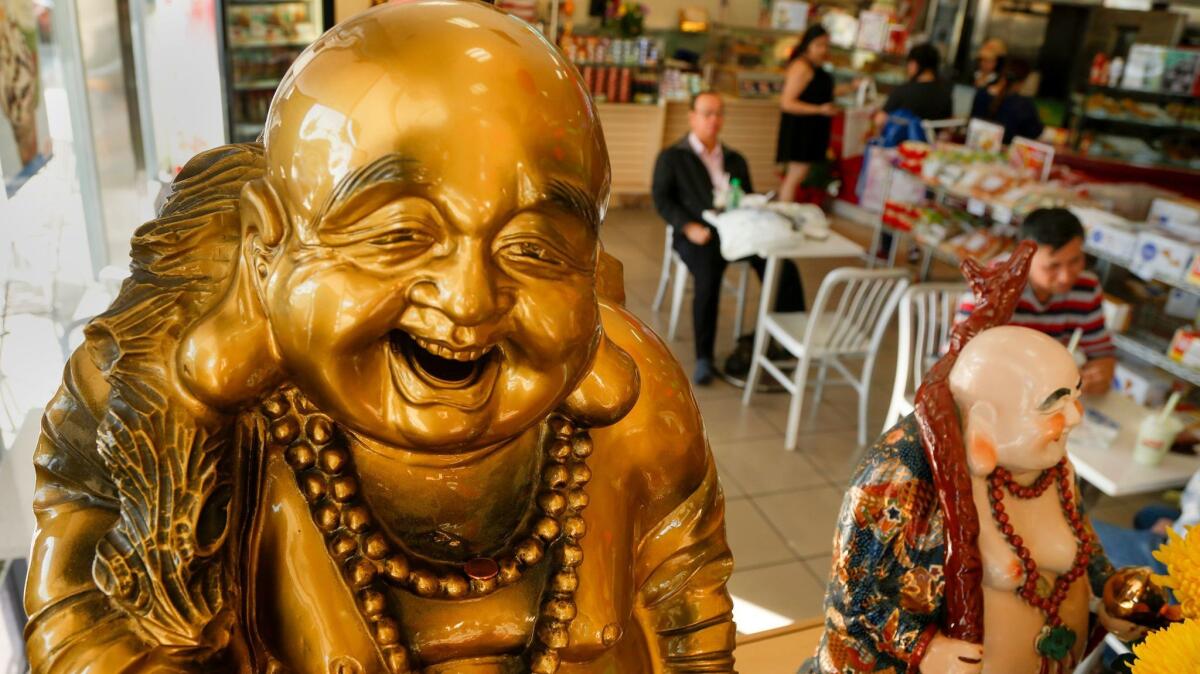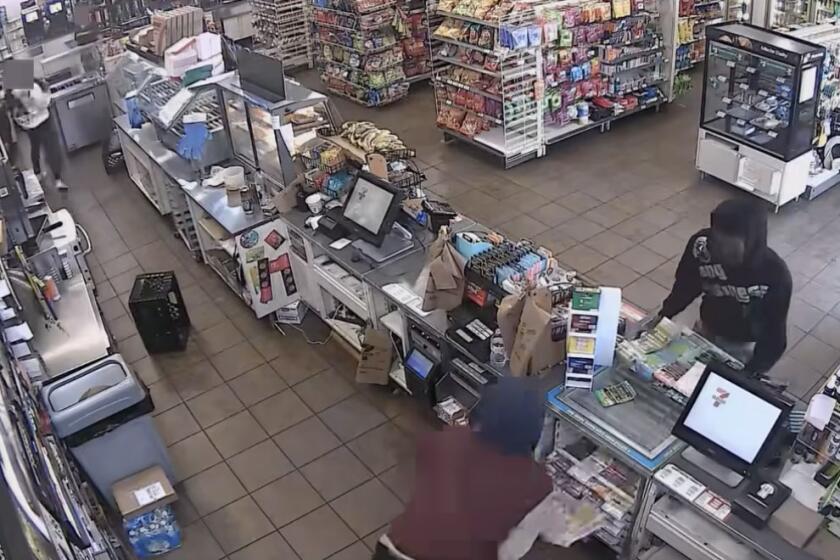Trump widens a generation gap in Vietnamese community: Older hard-liners vs. liberal youths

Steve Tran lifted the lid on the news rack along Little Saigon’s Moran Street and exclaimed: “Great man!”
“I tell you, this idea he has of keeping out Muslims is the right thing to do,” said the 80-year-old, a refugee of the Vietnam War. “We are the good refugees. They’re not political refugees like we were. There are two types of people who want to come to America — those who seek freedom and those who go out to destroy it.”
But Tran’s grandson takes a decidedly grimmer view of Trump’s crackdown, and that speaks to a larger generational divide in a community so profoundly built around its refugee roots.
“It’s a little racist to consider that Muslims are terrorists and to think that if one Muslim does something bad, others are like him too. That’s not what I was taught,” Kevin Tran, 14, said.
NEWSLETTER: Get the day’s top headlines from Times Editor Davan Maharaj »
The teenager, an eighth-grader at Emmaus Lutheran School in Alhambra, was born in California, but like most young Vietnamese Americans he is the fruit of the mass exodus out of Vietnam into the U.S. after the war ended in 1975. In Orange County, they created the largest population of people of Vietnamese descent outside of of Vietnam: more than 300,000, with thousands of businesses scattered across Westminster, Garden Grove, Fountain Valley and Santa Ana.
That community got its start when President Gerald Ford allowed thousands of Vietnamese refugees fleeing the fall of Saigon and the victory of the communist North Vietnam government to resettle in America.
Like many Vietnamese Americans of his generation, Steve Tran is a loyal Republican.
Unlike his immigrant grandfather, Kevin has lived much of his life, including in classrooms, surrounded by people of differing cultures, races and religions.
This younger generation has become increasingly more liberal and more likely to be Democrats, according to experts who view the generational shift as partly a product of socialization.
“The elders may be openly supporting Trump and the Republicans because they still feel an affinity for the party they view as fighting against the government that took over their homeland,” said Linda Vo, a professor of Asian American studies at UC Irvine. “Meanwhile, the younger folks are raised here. They share the experiences of other communities of color. They see more ethnic and religious differences, and their minds open up. They empathize with many cultural groups.”
By contrast, the first generation — the refugee generation — was hamstrung by language barriers that limited their interaction with the broader society and other groups, Vo added.
Kevin said his history teacher and his father, Donald Tran, both urged him to study the immigrant experience “because it helps me relate it to my own experience.”
But when it came to Trump’s executive order — which critics have called a Muslim ban — Kevin and his father came to wholly different conclusions.
“I’d be sad if we lived in an America that didn’t accept my dad when he first got here,” the teenager said. “He wouldn’t be the man he is without being able to live the way he wanted, and a bunch of people like the Vietnamese could have died. So why would we ban immigrants?”

In 1975, Viet Thanh Nguyen and his older brother and parents joined the first wave of Vietnamese fleeing the victorious communist government, ending up in Ft. Indiantown Gap, a resettlement camp in Pennsylvania.
They had to find sponsors to exit the refugee camp. For a while, the family split up. Nguyen was 4.
The haunting experience inspired the USC professor decades later when he published his first novel, “The Sympathizer,” which won a Pulitzer Prize for fiction in 2016.
His newest book is called “The Refugees,” a collection of short stories reflecting his mission to capture the immigrant voice “in pain and in happiness.”
“I honestly don’t think Vietnamese refugees are very different from other refugees, though there’s so much judgment,” Nguyen, 45, said. “Some of us refugees are perfectly comfortable with the idea that America can include the Vietnamese language in all its diversity, yet it can’t even include the presence of Syrians.”
He said he believes that the unstable, chaotic nature of refugees’ lives makes people fundamentally uncomfortable.
“People who are displaced by war or by political disasters remind us that we have a lot we can lose,” Nguyen said. “Maybe this is why refugees aren’t welcomed.”
At the Asian Garden Mall in Westminster, Ba Nguyen, 70, a retired pilot from Garden Grove, said he shied from questioning “all of these orders.”
“As a citizen, you need to support your president,” he added firmly. “If you don’t, it’s like a child living in your father’s house going against his own teaching. That doesn’t make sense.”
Just steps away, Cheryl Tran finished her papaya salad. The 40-year-old worker at a senior center was critical of Trump’s decision. She left Vietnam in 1988 with her half-sister, who was granted passage because her father was American.
“We can have terrorists from the inside — it’s not just from the outside. Didn’t they realize this when they tried to create a ban?” asked Tran. “The tendency is to improve yourself, then improve your surroundings. It’s the energy of immigrant groups that built America.”
Hoi Trinh, a lawyer who for decades has worked to resettle displaced families from Southeast Asia, said Vietnamese immigrants know what it’s like to flee the places you called home.
“Our Viet community is primarily a refugee community. We should always defend and protect refugee rights. It is both our privilege and our responsibility,” said Trinh, 46, whose father was sent to a reeducation camp at the end of the Vietnam War.
Communist officials banished the rest of his family to the “new economic zones,” which were often uninhabited mountainous areas with harsh living conditions. There they languished until 1980, after his father’s release, when he, his parents and siblings escaped by boat and eventually settled in Melbourne, Australia. He was 14.
“I would be farming now,” Trinh said, “if I had no opportunity for this new life.”
Danny Nguyen’s father is a graphic designer, his mother a hairstylist. The way the 23-year-old Orange Coast College student sees it, they live in the U.S. only “because America has always been a welcoming place.”
Most of his friends are Vietnamese Americans, whose parents have tales about their own postwar escapes from the place of their birth.
Nguyen knows little about his father’s existence before he was born. Van Nguyen, 55, said his first job in America was packing freshly baked bagels. He has never registered with any political party and chose not to vote in the last presidential election.
Danny Nguyen said people like his parents worry more about the everyday task of making a living, while their offspring “are more focused on living every day, like fully,” the Garden Grove math major said.
He believes the U.S. undercuts its future when it decides to block large groups of people, like his parents, who often showed grit and determination to get to its borders.
“America is losing out on a lot of productive people, bright people,” he said, “when you don’t give refugees the choice to be here.”
Twitter: @newsterrier
ALSO
California’s Democrats are trying to harness a new wave of progressive energy
Bill Maher’s ‘Real Time’ interview with Milo Yiannopoulos fuels new criticism
Treason! It’s a provocative charge being leveled against Trump, and one that rarely amounts to much
More to Read
Start your day right
Sign up for Essential California for news, features and recommendations from the L.A. Times and beyond in your inbox six days a week.
You may occasionally receive promotional content from the Los Angeles Times.






